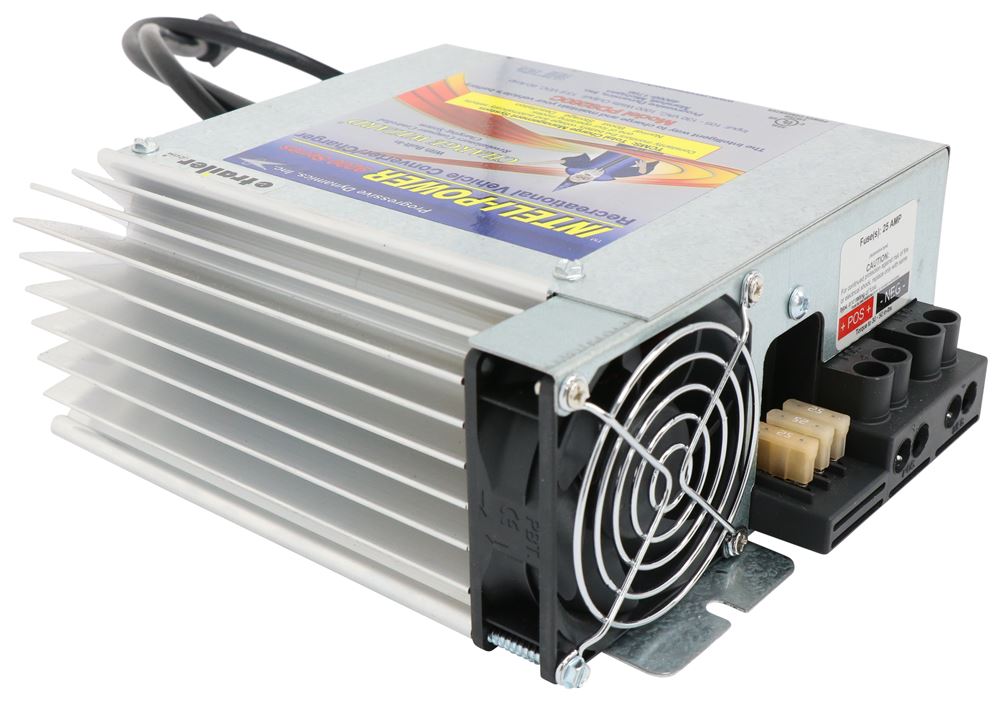


They are a great addition to a camper’s battery charging system. If you have a battery bank and want to recharge from a mains supply, a power converter or campervan battery charger is an essential piece of kit. You don’t need a converter if you don’t have a battery bank in your camper and only have household appliances.Īll the appliances will run from the campground mains supply. Read more: 2000w Renogy Inverter Charger Review Why Do I Need A Converter In My RV? But if your camper isn’t one of them, the in-built converter has failed, or you’re building a camper conversion, you can buy a separate converter charger. Some RVs already have a converter installed. That box is converting the AC supply to DC.īut most other DC appliances must have a DC power supply to run.

They have a transformer box between the end plugged into the main supply and the end into the device. The transformer converts the AC power to DC before it reaches the bulbs. LED lights are a good example where the cable has a transformer pre-installed so that they can be wired to the main circuit in your home. Some 12v appliances already have a kind of converter fitted. The mains voltage must be stepped down and transformed from 110v or 240v AC to 12v DC first. But DC appliances cannot run directly off an AC power supply. Some RV owners have DC appliances but no battery bank.

The main AC supply must be converted to take advantage of a shore hook up at a campsite or home to top up the batteries. You can only charge a battery bank with DC power. In simple terms, a power converter changes AC power to direct current (DC). We’ve recommended our top picks of RV power converters and included an installation guide at the end of the post too. This post will help you understand the basics of converters and battery chargers to decide what size you need and the key features to look out for when buying. You can spend time on a campground with a hookup facility or top up the batteries from home.Īn RV power converter is an essential electrical component in the hook up installation to recharge batteries. The ability to recharge the battery bank from a mains supply or electrical hookup (EHU) is a perfect fallback position. Watching the battery levels fall on the RV battery monitor as the clouds stubbornly refuse to lift indicates time to be more mindful about your electrical use.Ĭharging the batteries as you drive can give a boost, but running the engine long enough to get a decent charge is not always practical.
#Smart converter charger full
If you’re planning to live in a van full time or even for a few weeks at a time, you’ve probably already got your solar setup worked out to keep the battery bank charged.īut what about when the weather is against you for days on end? This guide will help you find the best RV converter charger for your rig. All PowerMax Brands come with a standard 2 year warranty.An RV converter charger keeps batteries charged from a shore power hookup, helping maintain them in tip-top condition, ready for your next boondocking trip. The PowerMax Brands can be used in many different applications.
#Smart converter charger series
The PM, PM3, and PMBC series units deliver exceptionally clean AC to DC power for Battery charging or as DC Power Supply. PowerMax Converters are the Industry Standard for providing the Ultimate Charge. Short Circuit Protection / Thermal Protection PowerMax power converter/battery chargers are engineered with the user and variable environmental conditions in mind. Power Max PM3 LK series converter / charger: with state of the art 3 stage smart charging technology and adjustable power supply mode. The PM3 series is designed to provide clean power with or without a battery. Clean, reliable DC power is ideal for powering electronics and appliances. Output ratings of 35, 45, 55, 60, 75, and 100 amps are available. The PM3 Series converter/ chargers are versatile, advanced power source solutions. PowerMax 60 Amp 12 Volt Converter / Charger


 0 kommentar(er)
0 kommentar(er)
